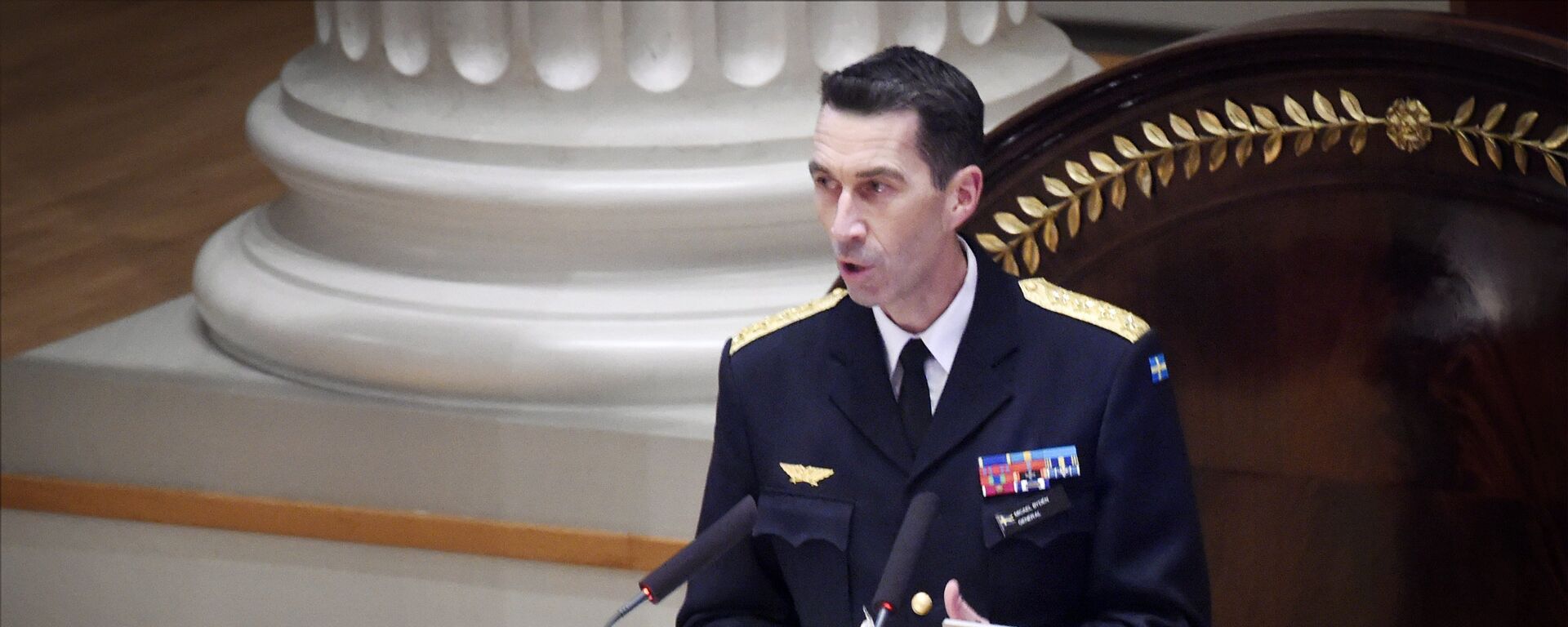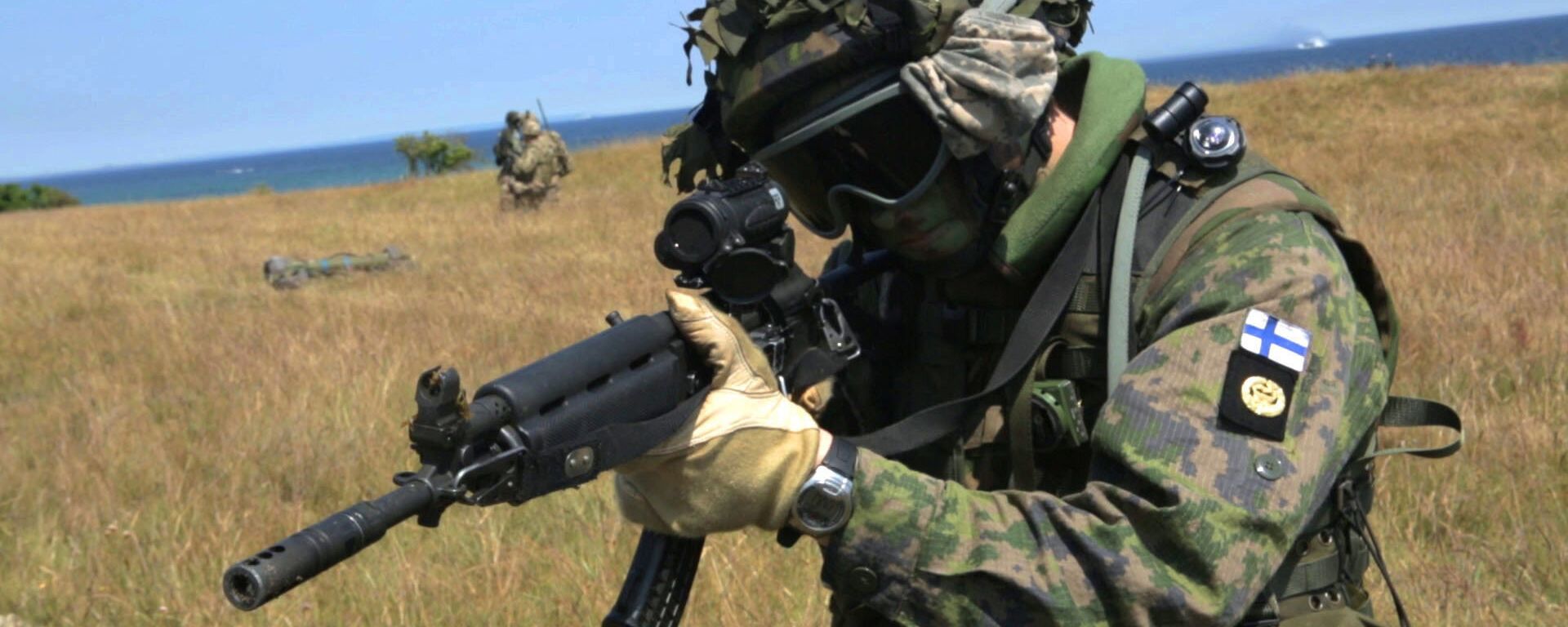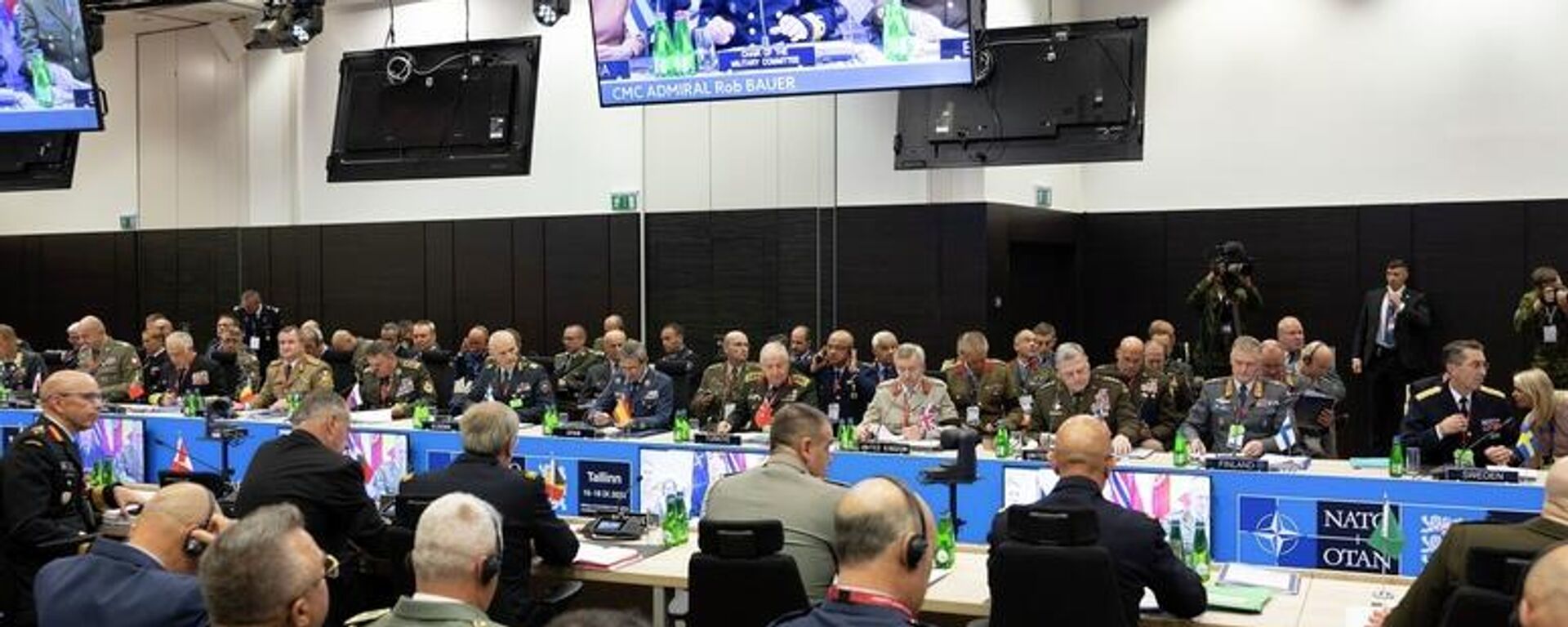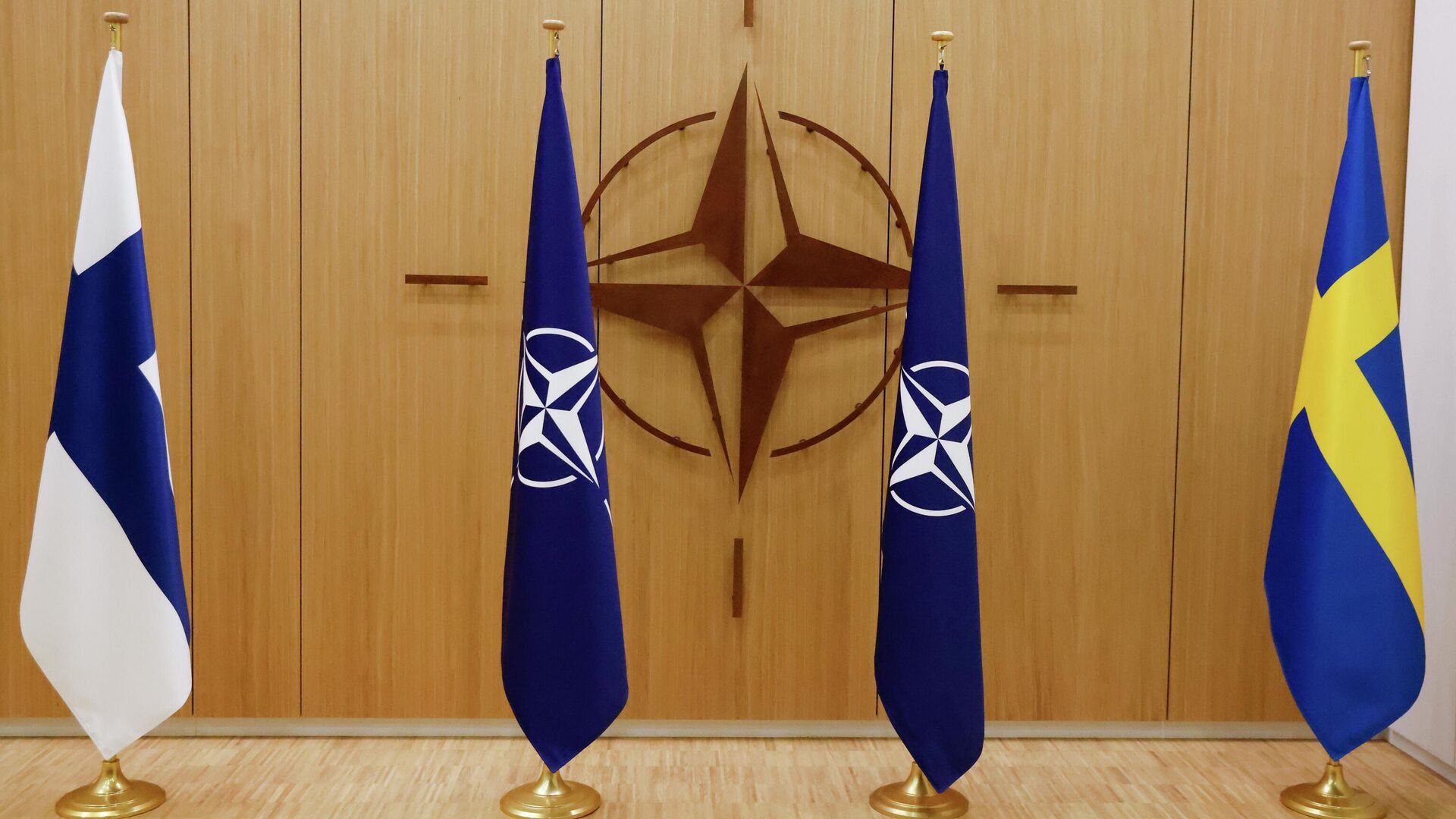https://sputnikglobe.com/20221112/swedens-foreign-minister-tones-down-generals-no-red-lines-on-spurning-nukes-rhetoric-on-nato-bid-1104051354.html
Sweden’s Foreign Minister Tones Down General’s ‘No Red Lines on Spurning Nukes’ Rhetoric on NATO Bid
Sweden’s Foreign Minister Tones Down General’s ‘No Red Lines on Spurning Nukes’ Rhetoric on NATO Bid
Sputnik International
sweden's foreign minister has ruled out stationing of nuclear weapons after joining nato
2022-11-12T12:43+0000
2022-11-12T12:43+0000
2022-12-07T10:18+0000
world
nato
sweden
nuclear weapons
finland
vladimir putin
nuclear
https://cdn1.img.sputnikglobe.com/img/07e6/07/03/1096913658_0:160:3073:1888_1920x0_80_0_0_9d4b2918d90cff3a843246f5ea3e47f5.jpg
Sweden will not agree to the stationing of nuclear weapons on its territory after it is officially accepted into the North Atlantic Treaty Organization (NATO), the Swedish Foreign Minister, Tobias Billstrom told a local news agency on November 12.Tobias Billstrom suggested that when his country ultimately joins the military alliance, it would follow in the footsteps of Denmark and Norway, two NATO founding members, who have not permitted stationing of nuclear weapons on their territories.The statement comes in sharp contrast to the recent remarks by the Supreme Commander of the Swedish Army, General Micael Bydén. Expounding upon the new plan for Sweden's Armed Forces for the years ahead, Bydén was cited by local media as saying he had recommended the government to not set any red lines regarding NATO bases or nuclear weapons stored on Swedish territory.Sweden's Supreme Commander described the present situation as “very serious” and said the military cannot rule out “even more serious developments”. Bydén also admitted that Sweden, in violation of its principle not to send weapons to nations 'at war', has been supplying the authorities in Kiev with arms and training Ukrainian soldiers.The statements elicited a swift response from the Social Democrats' foreign policy spokesman Morgan Johansson, who told reporters:A similar view on nuclear arms and military bases was shared by Håkan Svenneling, foreign policy spokesman for the Left Party.Nevertheless, earlier, Sweden's Prime Minister Ulf Kristersson said his country and Finland should adopt a joint approach regarding their NATO membership bid, after the Finnish government's draft law on joining the bloc was reported to allow the alliance to bring in nuclear weapons onto its territory. Finland's Prime Minister Sanna Marin later confirmed that Helsinki had not ruled out nuclear weapons on its territory. Echoing Kristersson, Defense Minister Pål Jonson stressed that Sweden and Finland had “started the process hand in hand” and should proceed as such.When submitting its NATO application in May this year, the Swedish government, then led by the Social Democrats, had made a specific pledge to keep the alliance’s nuclear weapons and permanent bases outside the country’s borders. The Moderates, in opposition at the time, had indicated support for this stance. Since then, the Moderate Party-led alliance won the September general election in Sweden.Earlier in the year, shortly after Russia started its special military operation in Ukraine on February 24, Sweden and Finland applied to join NATO. Walking out on decades of neutrality, the two Nordic countries argued that the Ukraine crisis had prompted a shift in the security situation in Europe.So far, the application, ratified by 28 of NATO's 30 countries, has stalled, as Hungary pledged to officially endorse the bids by mid-December. As for Turkey, both Sweden and Finland are still in talks with Ankara to dispel its concerns over their alleged support of Kurdish organizations which Turkey labels as terrorist.The US, the UK and France are, to date, the only three NATO members who possess nuclear arms. Regarding the Sweden and Finland’s membership bids, Press Secretary of the President of the Russian Federation Dmitry Peskov stated that further expansion of the alliance would not bring greater security to Europe, Russian President Vladimir Putin noted that abandoning Finland's traditional policy of military neutrality would be erroneous, since there are no threats to its security, adding:
https://sputnikglobe.com/20221103/swedish-military-prepares-for-war-wants-kamikaze-drones--rocket-artillery-1103470651.html
https://sputnikglobe.com/20220826/turkey-remains-the-major-deterrent-to-finland-and-swedens-nato-aspirations-analysts-warn-1100042041.html
https://sputnikglobe.com/20220917/nato-began-planning-expanded-presence-near-russia-years-ago-top-commander-admits-1100911445.html
sweden
finland
Sputnik International
feedback@sputniknews.com
+74956456601
MIA „Rossiya Segodnya“
2022
News
en_EN
Sputnik International
feedback@sputniknews.com
+74956456601
MIA „Rossiya Segodnya“
Sputnik International
feedback@sputniknews.com
+74956456601
MIA „Rossiya Segodnya“
sweden will not allow nuclear weapons on its soil after jining nato, foreign minister says, sweden will not agree to the stationing of nuclear weapons on its territory after it is officially accepted into nato said swedish foreign minister,
sweden will not allow nuclear weapons on its soil after jining nato, foreign minister says, sweden will not agree to the stationing of nuclear weapons on its territory after it is officially accepted into nato said swedish foreign minister,
Sweden’s Foreign Minister Tones Down General’s ‘No Red Lines on Spurning Nukes’ Rhetoric on NATO Bid
12:43 GMT 12.11.2022 (Updated: 10:18 GMT 07.12.2022) Supreme Commander of Sweden's Armed Forces, General Micael Bydén, elicited a mixed response with earlier statements, admitting that he had advised his country’s government against setting any red lines initially when seeking NATO membership, such as not allowing the alliance’s bases or nuclear weapons on Swedish soil.
Sweden will not agree to the stationing of nuclear weapons on its territory after it is
officially accepted into the North Atlantic Treaty Organization (NATO), the Swedish Foreign Minister, Tobias Billstrom told a local news agency on November 12.
“It is still the long-term Moderate Party position. We have never intended to change the conditions for the application submitted by the previous government," Billstrom said.
Tobias Billstrom suggested that when his country
ultimately joins the military alliance, it would follow in the footsteps of Denmark and Norway, two NATO founding members, who have not permitted stationing of nuclear weapons on their territories.
The statement comes in sharp contrast to the
recent remarks by the Supreme Commander of the Swedish Army, General Micael Bydén. Expounding upon the new plan for Sweden's Armed Forces for the years ahead, Bydén was cited by local media as saying he had recommended the government to not set any red lines regarding NATO bases or nuclear weapons stored on Swedish territory.
"To set reservations at an early stage, before we have even joined, is to create friction and blockages and we want to avoid that," he said.
Sweden's Supreme Commander described the present situation as “very serious” and said the military cannot rule out “even more serious developments”. Bydén also admitted that
Sweden, in violation of its principle not to send weapons to nations 'at war', has been supplying the
authorities in Kiev with arms and
training Ukrainian soldiers.
The statements elicited a swift response from the Social Democrats' foreign policy spokesman Morgan Johansson, who told reporters:
“I want the government to make it clear that the reservations would continue to apply as they had said, otherwise it is very worrying. Sweden has said that we would have a reservation that we don’t not want any nuclear weapons on Swedish soil. It was a very important message to the Swedish people this spring and I believe that this message should stand firm.”
A similar view on nuclear arms and military bases was shared by Håkan Svenneling, foreign policy spokesman for the Left Party.
Nevertheless, earlier,
Sweden's Prime Minister Ulf Kristersson said his country and Finland should adopt a joint approach regarding their NATO membership bid, after the Finnish government's draft law on joining the bloc was reported to allow the alliance to bring in nuclear weapons onto its territory. Finland's Prime Minister Sanna Marin later confirmed that Helsinki had not ruled out nuclear weapons on its territory. Echoing Kristersson, Defense Minister Pål Jonson stressed that Sweden and Finland had “started the process hand in hand” and should proceed as such.

3 November 2022, 08:44 GMT
When
submitting its NATO application in May this year, the Swedish government, then led by the Social Democrats, had made a specific pledge to keep the alliance’s nuclear weapons and permanent bases outside the country’s borders. The Moderates, in opposition at the time, had indicated support for this stance. Since then, the Moderate Party-led alliance won the September
general election in Sweden.

26 August 2022, 18:06 GMT
Earlier in the year, shortly after Russia started its special military operation in Ukraine on February 24, Sweden and Finland applied to join NATO. Walking out on decades of neutrality, the two Nordic countries argued that the
Ukraine crisis had prompted a shift in the security situation in Europe.
So far, the application, ratified by 28 of NATO's 30 countries, has stalled, as Hungary pledged to officially endorse the bids by mid-December. As for Turkey, both Sweden and Finland are still in talks with Ankara to
dispel its concerns over their alleged support of Kurdish organizations which Turkey labels as terrorist.
The US, the UK and France are, to date, the only three NATO members who possess nuclear arms.
Regarding the Sweden and Finland’s membership bids, Press Secretary of the President of the Russian Federation Dmitry Peskov stated that
further expansion of the alliance would not bring greater security to Europe, Russian President Vladimir Putin noted that abandoning Finland's traditional policy of military neutrality would be erroneous, since there are no threats to its security, adding:
"There is nothing to worry us in terms of Swedish and Finnish membership of NATO… Everything is good between us, but now there will be some tension, that is obvious... They must clearly understand that previously there were no threats to them — but if troops are stationed there and infrastructure established, we will have to respond accordingly.”

17 September 2022, 18:56 GMT





